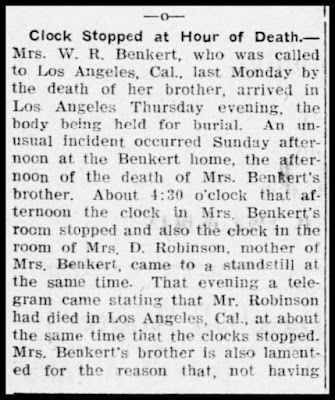I recalled reading vague claims that sometimes clocks mysteriously stop at the hour of someone's death. I decided to look for old newspaper accounts that might verify this claim. I found quite a few cases.
Below is an account of a grandfather clock that worked fine for 30 years before mysteriously stopping and catastrophically failing at the hour of its owner's death.
Below is a very similar account of a clock stopping at someone's death:
You can read the account here:
https://chroniclingamerica.loc.gov/lccn/sn82014519/1919-10-11/ed-1/seq-1/
Below is another similar account of a clock stopping at someone's death:
You can read the account here:
Below is an account of a clock that seemed to foretell or announce deaths of members of the Danbury Hat Makers Association (presumably having few members):
Below is a newspaper account of two clocks stopping at the time of the same person's death:
On the page here, we read, "The New York papers also give a good deal of space to the fact that John Judge, a New York saloon keeper,
died in his saloon and at the very moment of his death the
saloon clock stopped."
Below is a newspaper account of a clock that stopped once at the hour of a family member's death, and also stopped at a very different hour when another member of the same family died.
Below is another newspaper account of a clock that stopped at the hour of a family member's death.
Below is another newspaper account of a clock that stopped at the hour of a family member's death.
Below is another newspaper account of a clock that stopped at the hour of a family member's death.
On the page here we have an account saying that Lynda Barton's father died at 9:30 PM on a Sunday, and that all of the clocks in the house stopped at 9:30 PM. We are also told that on the following Sunday all of the clocks again stopped at 9:30 PM.
Below we have an account of a clock which makes strange noises at the time of a family member's death, not just once but twice. It is followed by an account of a long-broken clock which mysteriously starts running shortly after a family member's death
You can read the account here:
On the same page we have the account below, which has nothing to do with clocks, but may offer better evidence for life after death than any of the accounts above. Click to read the account better. In the account Sir Edward Marshall Hall says he took a recent letter from his brother, folded it, and sealed it in an envelope with no outside indication of the letter's author. He gave the sealed envelope to his sister, requesting her to take it to the medium Miss Wingfield, to see whether she could determine the author of the letter. An answer comes back from the medium that the author is dead. When then asked where and when the death occurred, an answer comes back from the medium in early March that the author of the letter died yesterday in South Africa. Soon Sir Edward learns by letter that his brother did die in South Africa, in early March.
A matching account occurs in a biography of Sir Edward Marshall Hall. We have a reference to automatic writing, a technique in which a medium may go into a light trance, and produce writings, which seem to come from her subconscious or from some external source, perhaps some deceased spirit. On pages 111-112 we read this about Sir Edward Marshall Hall:
"On March 10th, 1894, he was staying with his sister at Hampton. Mrs. Labouchere had been for some time an intimate friend of Miss Wingfield. On this occasion the latter was answering, by automatic writing, questions put to her. Marshall was sceptical, and it occurred to him that he had the means of testing her powers. He had in his pocket a most unpleasant letter, received a day or two before from his elder brother. John Cressy Hall was much older than Marshall, and had long since fallen, from high prosperity as a merchant, into poverty; in 1894, he was living in South Africa on remittances sent him by Marshall. For his own protection, the money was sent through a certain Archdeacon Gaul: this was strongly resented, and the letter in Marshall’s pocket was the culmination of a very offensive correspondence on the subject, and was dated February 1894. Marshall had said nothing about this unpleasant letter to his sister, and decided to ask Miss Wingfield as to the authorship of it; he sealed it in a blank envelope, and handed it to Miss Wingfield. After some delay a message was spelt out: 'The writer of this letter is dead.' To the question, ' When and where did the writer die? ' the answer came, ' He died yesterday in South Africa.'
The seance made only a temporary impression on Marshall’s mind....On April 2nd, 1891, he received a second letter from Gaul, bearing a Kimberley postmark of March 8th, to the following effect: 'Dear Sir, — I little thought when I wrote last week that I should have this week the melancholy duty laid on me of informing you of the death of your brother, which occurred yesterday.' Poor Cressy Hall had, indeed, been found on March 8th dead in his bed. The message received through Miss Wingfield on March 10th had stated that the writer of the letter had died in South Africa ' yesterday ' — that is, March 9th. But, even with this slight discrepancy, it was a very strange experience."













No comments:
Post a Comment